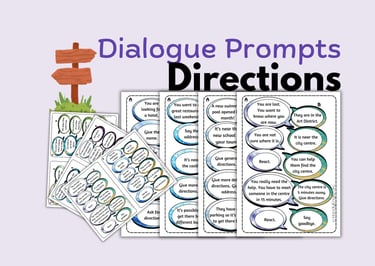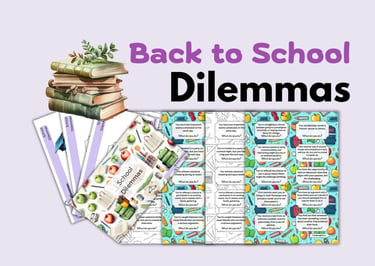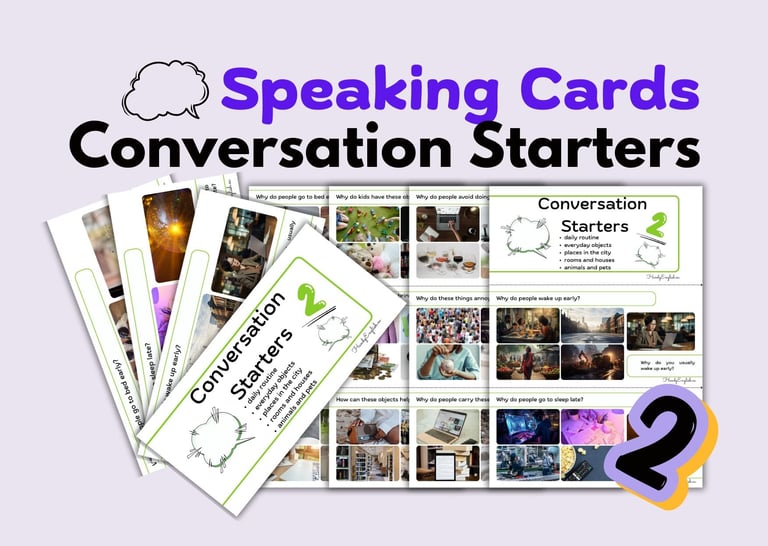[BLOG] The Best Speaking Activities For Your English Lessons
Not sure which option is for you? Read this blog post about choosing the best speaking activities for your lessons and find out and find out!
Kaya
6/1/2024
Please keep in mind that the opinions posted on this blog are my own.
Everybody might have a different experience and opinions, and that's OK.
The Best Speaking Activities for English Lessons
Can my lessons be both attractive and efficient?
Speaking is one of the best ways to improve a foreign language, but students don't always want to just sit and chat.
Speaking activities can give structure and a sense of accomplishment.
Discover the best speaking activities that will boost confidence and fluency in your students!
Read this blog post to explore engaging and interactive ideas perfect for any classroom.
From role-plays and debates to storytelling and discussion circles, we've got you covered!
Conversation Starters: Warm-Up Activities and Vocabulary Revision
Conversation starters are essential tools for English lessons, serving as excellent warm-up activities that help students ease into speaking English. These activities are fantastic for vocabulary revision, encouraging learners to use newly acquired words in context. Simple questions about daily routines, favourite hobbies, or current events can spark engaging conversations and boost students' confidence in speaking.
Speaking Cards: Simple but Effective
Speaking cards are a straightforward yet highly effective method to promote speaking skills. Each card contains a unique topic or question that students must discuss. This activity can be adapted for different proficiency levels, making it suitable for both beginners and advanced learners. Speaking cards help students practice fluency, improve their ability to think on their feet, and expand their vocabulary.
Dialogue Prompts: Structured Practice
Dialogue prompts provide a more structured approach to speaking practice, guiding students through specific scenarios. These prompts help students practice grammar, sentence structure, and pronunciation. By working in pairs or small groups, learners can role-play various dialogues, such as ordering food at a restaurant or asking for directions, which enhances their conversational skills in real-life situations.
By incorporating these speaking activities into your English lessons, you can create an engaging and dynamic learning environment that motivates students to practice and improve their speaking skills.
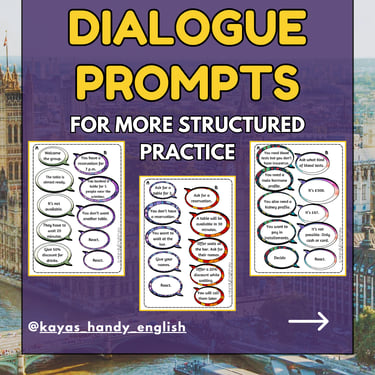

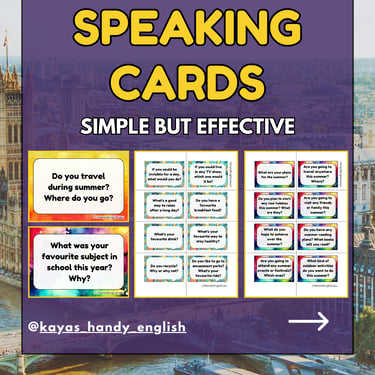

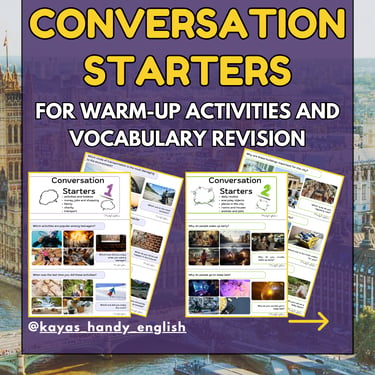

Surprise! You have just found amazing speaking activities for your English lessons!
How useful!
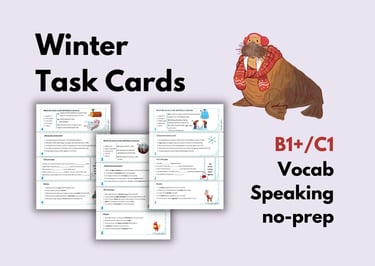

Role-Plays: Practising Real-Life Situations
Role-plays are invaluable for practising real-life situations where English might be used. Students can assume different roles and act out scenarios like job interviews, doctor visits, or customer service interactions. This activity not only improves their speaking abilities but also helps them gain confidence and develop problem-solving skills in a supportive environment.
Debates: Forming and Defending Arguments
Debates are an excellent way for students to practise forming and defending arguments in English. This activity encourages critical thinking, persuasive speaking, and the use of advanced vocabulary. By debating various topics, learners can improve their fluency, public speaking skills, and ability to articulate their thoughts coherently.
Dilemmas: Creative Problem Solving
Dilemmas present students with challenging situations that require creative problem-solving. This activity prompts learners to discuss possible solutions and weigh the pros and cons of each option. Dilemmas are particularly effective for developing critical thinking, decision-making skills, and the ability to express complex ideas in English.
Story Cards: For Creative Younger Learners
Story cards are perfect for younger learners who enjoy creative activities. Each card features a different element of a story, such as a character, setting, or plot twist. Students can use these cards to create their own stories, fostering imagination and enhancing their narrative skills. This activity also helps young learners practice using descriptive language and connecting ideas coherently.
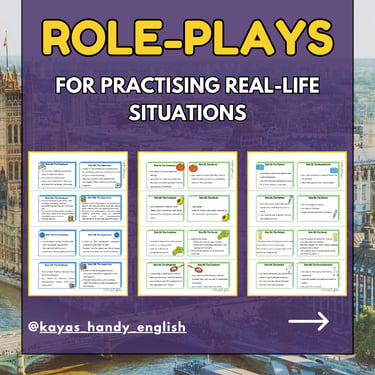

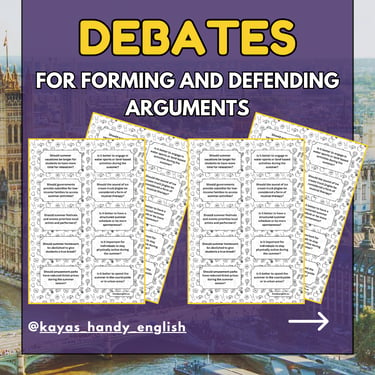

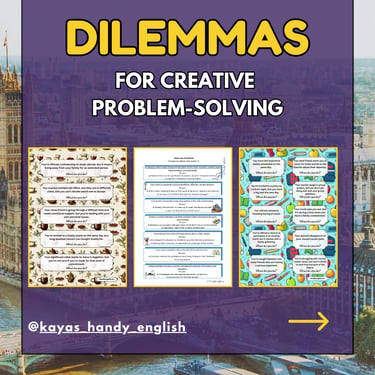

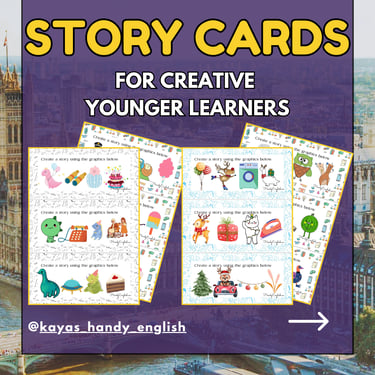

Get in touch!
Copyright Handy English 2021
”I used this with an adult ELL tutee of mine. I appreciate that the language was accessible for multiple proficiency levels, but the content wasn't obviously geared for children and still useful for older learners.”
August 7, 2023
”Another great resource from Handy English! I used it to give my students more in-depth practise into quantifiers and restaurant language. It's great resource and can be used after the students learn the basics of language for the restaurants and quantifiers. Definitely helped solidify what they learnt.”
February 5, 2023
”Love this resource. Great for fast finishers and also those in small ESL groups. Great for all macro skills as discussion and brainstorming is a great precursor for writing submissions.”
- Gail M.
June 25, 2023
Here's what other ESL Teachers say
Handy English: 4.8/5
”This was a wonderful resource for my students. It helped me introduce them easily to new concepts and it was quite engaging. Thanks!”
- Kiara B.
October 10, 2023
”Great resource for learning vocabulary, which supports comprehension and speaking skills.”
- Lori-Ann W.
September 29, 2023
”What a great way to get a healthy debate going. My students struggle with impulse control and they all have kept it kind and appropriate.”
- Alicia H.
September 17, 2023





